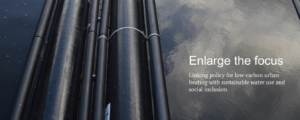Join JPI UE
Faq
FAQ
Please click here for the frequently asked questions we collected.
If you have an additional questions you are welcome to mail us at info@jpi-urbaneurope.eu

Creating sustainable heating infrastructures for the built environment is not just about reducing CO2 emissions, but also about sustainable water use and social inclusion, like energy justice. In this new policy brief by the ENLARGE project, you can learn to combine urban policies for low-carbon heating systems, sustainable water use, and social inclusion.
“The transition towards low-carbon heating of buildings is crucial for achieving climate goals, eliminating the consumption of fossil fuel and reducing CO2 emissions. With the Dutch Energy Agreement, the government of the Netherlands targets to become carbon neutral by 2050. Over the upcoming 30 years, the infrastructural changes that are needed to achieve this will however not only affect carbon emissions, but also the ways in which energy carriers are distributed and how homes are heated. We therefore argue for a focus on the effects of a heat transition that goes beyond reduction of carbon emissions. In this policy brief ‘Enlarge the focus’ you find key insights on the effects of a heat transition on water management and social inclusion obtained during the ENLARGE research project”
ENLARGE is supported in the SUGI Nexus call, a collaboration between European and North American funding agencies to support R&I in the food-water-energy nexus.
> Read the policy brief: Linking policy for low-carbon urban heating with sustainable water use and social inclusion.
> Go to the policy recommendations page